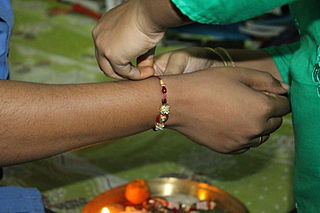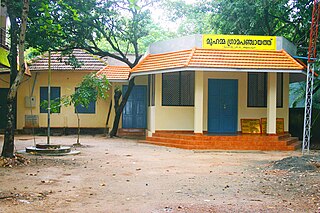Haralakatti | |
|---|---|
Village | |
| Country | |
| State | Karnataka |
| District | Belgaum |
| Languages | |
| • Official | Kannada |
| Time zone | UTC+5:30 (IST) |
Haralakatti is a village in Belgaum district in the southern state of Karnataka, India. [1]
Haralakatti | |
|---|---|
Village | |
| Country | |
| State | Karnataka |
| District | Belgaum |
| Languages | |
| • Official | Kannada |
| Time zone | UTC+5:30 (IST) |
Haralakatti is a village in Belgaum district in the southern state of Karnataka, India. [1]

India is the second most populated country in the world with nearly a fifth of the world's population. According to the 2019 revision of the World Population Prospects the population stood at 1,352,642,280.

Rajasthan is a state located in northern India. The state covers an area of 342,239 square kilometres (132,139 sq mi) or 10.4 percent of the total geographical area of India. It is the largest Indian state by area and the seventh largest by population. Rajasthan is located on the northwestern side of India, where it comprises most of the wide and inhospitable Thar Desert and shares a border with the Pakistani provinces of Punjab to the northwest and Sindh to the west, along the Sutlej-Indus river valley. It is bordered by five other Indian states: Punjab to the north; Haryana and Uttar Pradesh to the northeast; Madhya Pradesh to the southeast; and Gujarat to the southwest. Its geographical location is 23.3 to 30.12 North latitude and 69.30 to 78.17 East longitude, with the Tropic of Cancer passing through the southernmost tip of the state.

Raksha Bandhan, also Rakshabandhan, is a popular, traditionally Hindu, annual rite, or ceremony, which is central to a festival of the same name celebrated in South Asia, and in other parts of the world significantly influenced by Hindu culture. On this day, sisters of all ages tie a talisman, or amulet, called the rakhi, around the wrists of their brothers, symbolically protecting them, receiving a gift in return, and traditionally investing the brothers with a share of the responsibility of their potential care.
Gram Panchayat is a basic village-governing institute in Indian villages. It is a democratic structure at the grass-roots level in India. It is a political institute, acting as cabinet of the village. The Gram Sabha work as the general body of the Gram Panchayat. The members of the Gram Panchayat are elected by the Gram Sabha.
The administrative divisions of India are subnational administrative units of India; they are composed of a nested hierarchy of country subdivisions.
A sarpanch or gram pradhan or mukya is a decision-maker, elected by the village-level constitutional body of local self-government called the Gram Sabha in India. The sarpanch, together with other elected panchayat members, constitute gram panchayats and zilla panchayats. The sarpanch is the focal point of contact between government officers and the village community and retains power for five years.

Panchayati Raj is the system of local self-government of villages in rural India as opposed to urban and suburban municipalities.

India made its Summer Paralympic debut at the 1968 Games, competed again in 1972, and then was absent until the 1984 Games. The country has participated in every edition of the Summer games since then. It has never participated in the Winter Paralympic Games.

RannaBelagali is a Pattan Panchayat Town in the southern state of Karnataka, India. It is located in the Mudhol taluka of Bagalkot district in Karnataka

Dhavaleshwar is a village in the southern state of Karnataka, India. It is located in the Mahalingpur taluk of Bagalkot district in Karnataka. Dhavaleshwar is located on the bank of Ghataprabha river. The river bifurcates the Belgaum and Bagalkot districts. Just on the other side of the river, there is one more village which, is also known as Dhavaleshwar. This Dhavaleshwar belongs to Gokak Taluk of Belgaum district. Many politicians promised to build a bridge between both villages, but no one has initiated. The villagers grow sugar cane, which is the source of their income.

Handigund (ಹಂದಿಗುಂದ)is a village in the southern state of Karnataka, India. Its name derives from Hainagund(ಹೈನಗುಂದ), which means "famous for milking". The village is the site of three private primary schools and four high schools and one PU college. It is located in the Raybag taluk of Belgaum district in Karnataka.

Hulagabali is a village in the southern state of Karnataka, India. It is located in the Athani taluk toward north-east of Belgaum district. The basic occupation in Hulagabali is agriculture and there are also many landlords in the village who are famous in agriculture. Sugarcane is the highest percentage of agriculture as per the survey. There are quite a few temples in the village. The Birappa temple located in this village is well known in surrounding villages. Birappa temple has a large fair and festivities twice a year that draws huge crowd in the region. Sri Sangameshwara temple stands at the juncture of River Krishna and River Agrani. The famous landlords are Patil (Gouda).

Nej is a village in the southern state of Karnataka, India. It is located in the Chikodi taluk of Belgaum district in Karnataka. Nej covers an area of about 30 km2 (12 sq mi).

Nidagundi is a village in the southern state of Karnataka, India. It is located in the Raybag taluk of Belgaum district in Karnataka.

Uchagaon is a village in the southern state of Karnataka, India. It is located in the Belgaum taluk of Belgaum district in Karnataka. Last village on the way towards maharastra.
A tehsil is a local unit of administrative division in some countries of the Indian subcontinent that is usually translated to "township". It is a subdistrict of the area within a district including the designated city, town, hamlet, or other populated place that serves as its administrative centre, with possible additional towns, and usually a number of villages. The terms in India have replaced earlier geographical terms, such as pargana (pergunnah) and thana.

Karajagi is a village in jath, in the state of Maharashtra]], India. It is located in the jath taluk of sangli district.
Ingalagi is a panchayat village in Belgaum district in the southern state of Karnataka, India.

The Panchayat raj (panchayat "village council", raj "rule") is a political system, originating from the Indian subcontinent, found mainly in India, Pakistan, Bangladesh, Sri Lanka, and Nepal. It is the oldest system of local government in the Indian subcontinent, and historical mentions date to the 250 CE period. The word raj means "rule" and panchayat means "assembly" (ayat) of five (panch). Traditionally, Panchayats consisted of wise and respected elders chosen and accepted by the local community. These assemblies settled disputes between both individuals and villages. However, there were varying forms of such assemblies.